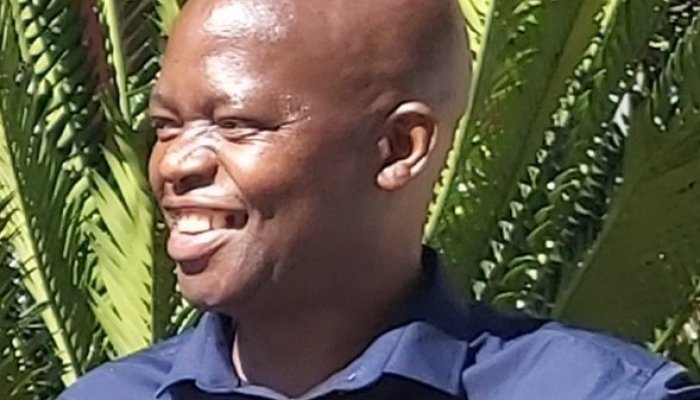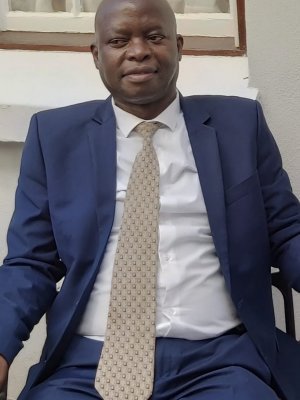GIBS professor and agricultural economist, Godswill Makombe, has been working with Dr. Obvious Mapiye, Professor Kennedy Dzama and Dr. Annelin Molotsi from Stellenbosch University’s Department of Animal Sciences. Alongside Joubert de Wet of Stellenbosch University’s Innovus Technology, the group is developing the LMDS app to enhance information shared with farmers and gather much-needed data on the sector.
Background
Small-scale and emerging farmers are a reality across Africa. Their challenges are well documented, and governments across the continent actively work to increase these farmers' productivity levels.
According to Makombe, governments usually have good systems in place that try to educate farmers on better farm management practices. He explains that this is done through extension services. “Extension means giving the farmers up-to-date information about current production practices and the technologies they can use to improve their productivity,” he says.
However, these departments cater to many farmers while operating on extremely limited resources. Makombe highlights that one extension officer may be responsible for up to 300 farmers. However, if a colleague’s car breaks down, that officer’s load can increase to 600. So, although government programmes are well-intentioned and can have a positive impact, these numbers nullify their efficacy.
Mapiye, who was working on his post-graduate degree, sought the help of Makombe to find a way to address this issue through technology. Mapiye and Makombe, in partnership with Mapiye’s dissertation supervisors, came up with the idea of designing a simple app that farmers could use if they had access to the internet and a smartphone.
Dr. Obvious Mapiye
Mapiye, who grew up in the Mhondoro Ngezi farming district in Zimbabwe, was well versed in the challenges faced by small-scale and emerging farmers and wanted to research and identify specific challenges these farmers encountered. Knowing this was not a new field of study, Mapiye, with a background in agricultural sciences, designed his Master’s research to specifically target the aspects that an app aimed at these farmers would need. He focused his study on emerging Nguni cattle farmers in the Limpopo province. The thinking was that although most people may associate scale farming with crop farming, the animal agriculture sector offers the greatest impact on the smallholder system because they participate across the entire agricultural value chain.
The group of farmers Mapiye studied were not small-scale farmers. The government had already developed a programme to support them to help them commercialise their operations. Although they were bigger than small-scale farmers, Makombe notes that the lessons they could teach around the challenges to commercialise could be used across all agriculture sectors.
Mapiye’s study looked at some of the problems associated with smallholder livestock and smallholder production and the methods they use to relieve these problems. He also looked at the extension system and evaluated the constraints associated with various extension models. “These systems have been tried, and they have had some impact, but they still face similar budgetary constraints,” says Makombe.
Once Mapiye had finished his Master’s, he felt there was a gap in the information needed for the app. So it was decided that Mapiye would continue studying the problem through his PhD research. Part of this was around understanding the usefulness of the LMDS to small-scale and emerging farmers. This time he worked with Nguni cattle farmers in the North West province.
“He designed his PhD to delve into the problems of smallholder farmers and how it can now include the theories of extension, how they're supposed to work, and how we can incorporate some of that thinking into the app,” says Makombe.
The app
The team wanted the app to be simple. In fact, the solution they developed was so simple that they were surprised that it had not been done before. The idea is that the app is not a stand-alone solution but rather supports the government’s extension programmes.
“One of the main impacts that we think the LMDS will have, which is what we are really targeting, is that it reduces that extensive effort to formulation,” Makombe explains. He believes this app will be extremely disruptive to the way these small-scale farmers operate. Rather than have extension workers visit each of their assigned farmers, the information could be relayed to farmers en masse through the app. “We think the app is an improvement on the extension system, and the combination will help the input.”
As Mapiye was a student at the University of Stellenbosch, his research and the idea of the app were picked up by the university’s Innovus division which supports student innovation and entrepreneurial endeavours. It assists with funding and intellectual property and is responsible for managing and commercialising innovations through licensing and spin-out companies.
Data
However, despite the exciting business opportunity for these academics, there is another important aspect to the application: data collection. As any academic researching business in South Africa knows, without relevant data, research is impossible.
Makombe says he did his PhD at Colorado State University in the United States in 1998: “The first statement that the professor told us as a class was that one of the biggest challenges of studying smallholder systems in Africa is that there is no data that describes the system.” Nearly two and a half decades later, a lack of data is still a hurdle that academics in the sector face.
LMDS is looking to address this issue of data. “We are hoping that in the long term, we might be able to close that gap,” says Makombe, adding that a lack of data does not mean there has been no research or studies into the sector. It means that most studies are cross-sectional and look at something at a point in time. Some of the longitudinal studies may give researchers three or five years of data, but this app will hopefully change that by collecting a long-term series of data. And if their business model works, this should give academics a long-term solution to data collection.
Makombe, Mapiye and their partners are now at the funding phase of the project and are looking for public and private support to develop the minimum usable product. Makombe estimates they will need R2 million to get the app up and running.
KEY TAKEAWAYS
- Simple solutions are often the most effective.
- Just because a solution is simple, it does not mean it has already been found.
- The findings of academic research need to be accessible to the agricultural industry to be of value.
- Collaboration across academic institutions is positive for development at the grassroots level.
- Commercialising academic ideas will encourage innovation.






